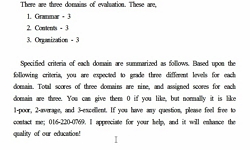This study investigated the washback effect of the EBB rating scale in writing classes. Specifically, this study explored college students’ perceptions of the EBB rating scale, in comparison with the holistic rating scale. The participants were coll...
http://chineseinput.net/에서 pinyin(병음)방식으로 중국어를 변환할 수 있습니다.
변환된 중국어를 복사하여 사용하시면 됩니다.
- 中文 을 입력하시려면 zhongwen을 입력하시고 space를누르시면됩니다.
- 北京 을 입력하시려면 beijing을 입력하시고 space를 누르시면 됩니다.
부가정보
다국어 초록 (Multilingual Abstract)
This study investigated the washback effect of the EBB rating scale in writing classes. Specifically, this study explored college students’ perceptions of the EBB rating scale, in comparison with the holistic rating scale. The participants were college students taking the academic writing course and they completed the survey right after evaluating their essays using the holistics rating scale as well as the EBB rating scale. The survey results showed that a majority of students perceived the EBB rating scale useful in checking out the mastery of overall lesson objectives. It was also found that students had different perceptions of usefulness of the EBB rating scale according to different background information such as TOEIC scores and self-assessment of English proficiency. Students with TOEIC scores below 500 thought that using the EBB rating scale made them grasp the overall lesson objectives. Also, students who self-assessed their English proficiency low perceived that the EBB rating scale was useful in diagnosing their own writing weaknesses and comprehending criterial questions. The findings can provide practical implications of the EBB rating scale for writing courses, which also can serve as a valuable reference for course planners in similar contexts.
참고문헌 (Reference)
1 고원준, "작문 수업에 적용한 과업 기반 지도와 자기 평가에 관한 연구" 한국중등영어교육학회 1 (1): 3-32, 2008
2 이영주, "영작문 시간에 활용된 자동 쓰기 평가 피드백에 대한 학생들의 인식 탐색" 한국중등영어교육학회 10 (10): 143-164, 2017
3 이호, "귀납적 이분법 척도를 활용한 예비 영어교사의 영어말하기 평가 신뢰도와 효용성에 관한 연구" 한국교원교육학회 27 (27): 215-237, 2010
4 Plakans, L., "Writing scale development and use within a language program" 4 (4): 151-163, 2013
5 Upshur, J., "Systematic effects in the rating of second-language speaking ability : Test method and learner discourse" 16 : 82-111, 1999
6 Turner, C., "Rating scales derived from student samples : Effects of the scale maker and the student sample on scale content and student scores" 36 : 49-70, 2002
7 Turner, C., "Listening to the voices of rating scale developers" 56 (56): 555-584, 2000
8 Fulcher, G., "Evaluating quality in second language performance tests" 1 : 3-19, 2007
9 황성삼, "EBB를 이용한 중등학교 말하기 평가척도 개발" 한국영어교육학회 63 (63): 307-331, 2008
10 Fulcher, G., "Does thick description lead to smart tests? A data-based approach to rating scale construction" 13 : 208-238, 1996
1 고원준, "작문 수업에 적용한 과업 기반 지도와 자기 평가에 관한 연구" 한국중등영어교육학회 1 (1): 3-32, 2008
2 이영주, "영작문 시간에 활용된 자동 쓰기 평가 피드백에 대한 학생들의 인식 탐색" 한국중등영어교육학회 10 (10): 143-164, 2017
3 이호, "귀납적 이분법 척도를 활용한 예비 영어교사의 영어말하기 평가 신뢰도와 효용성에 관한 연구" 한국교원교육학회 27 (27): 215-237, 2010
4 Plakans, L., "Writing scale development and use within a language program" 4 (4): 151-163, 2013
5 Upshur, J., "Systematic effects in the rating of second-language speaking ability : Test method and learner discourse" 16 : 82-111, 1999
6 Turner, C., "Rating scales derived from student samples : Effects of the scale maker and the student sample on scale content and student scores" 36 : 49-70, 2002
7 Turner, C., "Listening to the voices of rating scale developers" 56 (56): 555-584, 2000
8 Fulcher, G., "Evaluating quality in second language performance tests" 1 : 3-19, 2007
9 황성삼, "EBB를 이용한 중등학교 말하기 평가척도 개발" 한국영어교육학회 63 (63): 307-331, 2008
10 Fulcher, G., "Does thick description lead to smart tests? A data-based approach to rating scale construction" 13 : 208-238, 1996
11 Turner, C., "Developing rating scales for the assessment of second language performance. Australian Review of Applied Linguistics" 13 : 55-79, 1996
12 Upshur, J., "Constructing rating scales for second language tests" 49 : 3-12, 1995
13 Weigle, S. C., "Assessing Writing. Cambridge" Cambridge University Press 2002
14 송대연, "Applicability of an EBB Scale to English Speaking Performance Assessment in the Korean Secondary School" 팬코리아영어교육학회 21 (21): 111-135, 2009
동일학술지(권/호) 다른 논문
-
한국인 영어 학습자의 영어 동사구 종결성 습득 양상: 동사의 상 유형과 명사구를 중심으로
- 한국중등영어교육학회
- 최정인
- 2018
- KCI등재
-
한국 고등학교 학생과 교사의 영문법 학습 견해에 관한 정성적 연구
- 한국중등영어교육학회
- 강동호
- 2018
- KCI등재
-
Coh-Metrix를 활용한 중학교 학업성취도 평가 영어 지문의 코퍼스 언어학적 분석
- 한국중등영어교육학회
- 김준구
- 2018
- KCI등재
-
중2~3 영어 교과서와 NAEA 중3 영어 시험에 나타나는 관계절의 분포
- 한국중등영어교육학회
- 이현우
- 2018
- KCI등재
분석정보
인용정보 인용지수 설명보기
학술지 이력
| 연월일 | 이력구분 | 이력상세 | 등재구분 |
|---|---|---|---|
| 2028 | 평가예정 | 재인증평가 신청대상 (재인증) | |
| 2022-01-01 | 평가 | 등재학술지 유지 (재인증) |  |
| 2019-01-01 | 평가 | 등재학술지 유지 (계속평가) |  |
| 2016-01-01 | 평가 | 등재학술지 선정 (계속평가) |  |
| 2015-01-01 | 평가 | 등재후보학술지 유지 (계속평가) |  |
| 2013-01-01 | 평가 | 등재후보학술지 유지 (등재후보1차) |  |
| 2011-01-01 | 평가 | 등재후보학술지 선정 (신규평가) |  |
학술지 인용정보
| 기준연도 | WOS-KCI 통합IF(2년) | KCIF(2년) | KCIF(3년) |
|---|---|---|---|
| 2016 | 0.58 | 0.58 | 0.61 |
| KCIF(4년) | KCIF(5년) | 중심성지수(3년) | 즉시성지수 |
| 0.58 | 0.53 | 1.014 | 0.29 |




 KCI
KCI KISS
KISS


